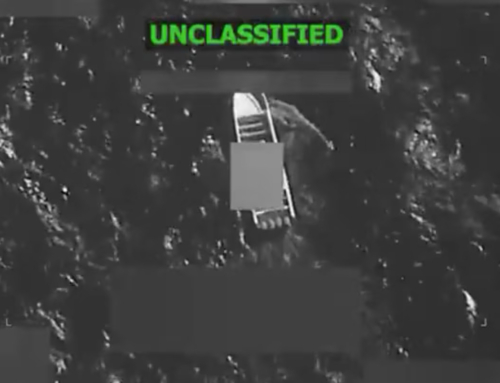
The Pentagon from above in Washington, DC
Most of the conversation about Pete Hegseth’s nomination for secretary of defense has focused on issues of his perceived lack of leadership experience running a mammoth organization like the DoD, or his polemics surrounding culture war issues such as DEI initiatives, females in combat, and so-called “woke” policies. These are all worthy of discussion, and I myself have written in the past of my own fears about progressive policies overtaking common sense in the military realm. For me, the larger issue with his nomination runs much deeper, at the baseline level of the character and moral judgement necessary for the execution of policy that leverages the most lethal military on earth.
One of the juicier tidbits swirling around is an accusation of sexual assault in 2017, something he has vehemently denied as consensual. It has devolved into a he-said/she-said fight, as if whomever is telling the truth should be the break point for the nomination, but it’s the underlying facts that matter to me.
Completely ignoring the accusation of sexual assault and relying solely on the record, the best-case scenario of this sordid tale is that Mr. Hegseth had a drunken tryst with a married woman during a paid speaking engagement in California, while his future wife was at home with his newborn child. The future wife, in turn, had become pregnant because Mr. Hegseth had cheated on his second wife with her – the second wife divorcing him shortly thereafter. The second wife met Mr. Hegseth while he was cheating with multiple partners on his first wife, causing the initial divorce in 2008.
I’m no prude, and understand a single mistake, but this points to a lack of character, the type of which transcends the sordid nature of the act, as it breeds dishonesty as a way of life. Lying about where one has been easily becomes lying about how many troops are in country X. Covering up a charge on a credit card bill becomes covering up the cost in blood of a mission. Creating a false pretense to visit city X becomes creating a false pretense to bomb country Y. If Mr. Hegseth so blithely ignores the vows he made with his wives under the eyes of Almighty God, how is one supposed to believe he holds any vow as worthy of following? How are we supposed to compare an oath to the constitution made in a brick building with one made to God in a church? I understand that in politics such a belief is quaint, what with past Whitehouse interns and aging porn stars making the headlines, but the secretary of defense first and foremost should have a character above reproach. One might not agree with, say, his decision on Afghanistan, or other policy decisions, but one should at least believe what he says is true, and that the decision was made in good faith and not because of a non-disclosure agreement at risk of exposure.
When someone wanted to try out for a unit I once belonged to, we used to screen their application packets first, before we extended the invitation. One of the mantras we used was “the best predictor of future performance is past performance”. The unit wasn’t a bunch of saints, and one mistake could – usually would – be forgiven, but multiple episodes of the same failing was no longer a mistake. It was a pattern of risk that we couldn’t afford. Had Mr. Hegseth applied with the known baggage he has, he wouldn’t have even been given an invitation to try out, and now he’s worthy of commanding not only that unit, but the entire US military? I’m honestly flabbergasted he was allowed to stay in the military at all. While almost never singularly prosecuted, adultery is, in fact, against the UCMJ – as several general officers have recently learned– and multiple infidelities even more so, precisely because it’s corrosive to good order and discipline. Slap on an accusation of sexual assault coupled with a payoff and a non-disclosure agreement, and there’s no way he should have even maintained a security clearance.
As bad as his faltering character is, Mr. Hegseth’s skewed moral judgement is of greater concern. The ultimate purpose of the US military is to close with and kill the enemy in a violent confrontation, but in so doing strive to maintain a moral clarity of purpose. Make no mistake, combat engenders a moral decay the moment one sets foot into it. You’re told your whole life “Thou shalt not kill” – it’s one of the founding principles of a just existence – and then you’re given a gun and told, “go kill that man”. Combat is a hellscape of endless moral turpitude, a relentless pounding of the soul, begging one to devolve into caricature of Lord of the Flies, and inevitably some succumb to that. Others do not. During the wars in Iraq and Afghanistan many men fell into the abyss, and such actions, if not held to account, cause a corrosion of the entire military effort from the roots up. Sometimes the difference between falling into the abyss and remaining on solid ground is leadership, yet when it is the leadership that fails, it can be catastrophic.
Pete Hegseth’s moral compass says otherwise. In three cases of men convicted of war crimes, he decried the prosecutions, proclaiming that they were unfairly accused by meddling bureaucrats far from the battlefield who have no idea what it takes to succeed in combat. These men had to make split-second decisions in the heat of battle, and now they were being unjustly convicted because of it. In actuality, nothing could be further from the truth. First, none of the accused actions involved any decisions made in the heat of combat, and second, in two cases – Navy SEAL Eddie Gallagher and 2LT Clint Lorance – it wasn’t nameless woke generals hunting for a scalp, but the very men under their command who turned them in. In the third case, it was the soldier himself who initiated the investigation. While taking a polygraph for a potential job in the CIA, MAJ Mathew Golsteyn admitted to an extrajudicial killing of a man in Afghanistan and the subsequent burning of his body. ***
The Navy SEALs are incredibly insular, with a code of Omerta that would rival any of the five families in New York, so much so that when the SEALs in combat with Gallagher reported his actions to their SEAL command, they were ignored. The SEALs underneath him thought his conduct was so egregious that they took the unprecedented step of going outside the SEAL chain of command and talking directly to big Navy NCIS. In 2LT Lorraine’s case, it was the low-level enlisted soldiers in his platoon. While he, as the leader, should have been the moral compass they would strive to emulate in combat, he failed, and it was left to the basic infantrymen underneath him to stand up and be counted. To endure the slings and arrows of men like Hegseth, with more power and clout than they’ll ever have. Which, by the way, says a hell of a lot more about their moral compass than Mr. Hegseth’s.
Hegseth turned on his megaphone, got the twitter crowd riled up with false cries of patriotism, and demanded they be absolved of their crimes. And so they were. Now, we’re asking him to be the face of the DoD, the very moral compass that 2LT Lorance was not, not for a single platoon, but for the whole damn military. How will he display the moral clarity we expect all who serve to emulate when he’s shown exactly where his compass points through his own actions?
I hear all the time that Mr. Hegseth is a combat veteran, and that alone grants him the knowledge and experience to lead the department of defense, but that is patently untrue. While combat experience should imbue the awesome responsibility inherent in the position, in the end it only reflects character. It doesn’t create it. Plenty of people have seen combat who remain unqualified. For instance, LT William Calley was also a combat veteran, and while Hegseth would probably absolve him of the mass slaughter of hundreds of Vietnamese civilians at My Lai, I still wouldn’t want him as my secretary of defense.
Footnote
***In the interest of fairness, and using the same metrics as the other cases, MAJ Golsteyn’s men stood by his leadership and refused to testify against him. After reviewing the preponderance of available evidence, while Gallagher and Lorance’s cases are pretty cut and dried in my mind, MAJ Golysteyn’s case is murkier. But, like everyone else –including Hegseth –I haven’t seen all the evidence that the jury did, and they convicted him.










Well said, Brad.
I was with you all the way until the Eddie Gallagher one. Apparently one of the men who turned him in all ready had a document accusing his future commander (who he had not even been deployed with yet) of war crimes. Along with all the other evidence through his book and the trial.. and the two men going to him in the brig to apologize and admit it was all made up.. which should be documented somewhere. As for the Pete hegeseth part I agree. I am also now a bit disappointed in Shawn ryan for elevating him without any mention of any of this. I have maybe been too trusting of the Shawn Ryan show goings on.
Honestly, you can believe what you want about Gallagher. What’s done is done, but the Iraq instance isn’t the first time he displayed immoral conduct.
https://sofrep.com/news/exclusive-navy-seal-eddie-gallagher-was-also-alleged-to-have-committed-murder-in-afghanistan/
I really would take anything he wrote in his book with an enormous grain of salt. You don’t get five SEALs saying another SEAL is a war criminal to big Navy — after their own SEAL command ignored it– just for some petty vendetta. Them simply making it all up beggars belief since their life was turned upside down because of it just like Gallagher. But I understand where you’re coming from.
Spot on. Thank you for articulating the argument so clearly.
Thank you. I always read the articles you write and have learned so much from them. They have, in turn, helped my view of many issues I was unaware of previously. My birth father, my husband, and my uncles served in various branches of the military. My son was a Corpsman in Iraq and is now in the Army JAG Corps. I imagine Pete Hegeseth will be confirmed but as always, you have helped my viewpoint. As an aside, I have all of your books and love the series.
I was on the fence about his confirmation but your cogent articulation of the facts has me hoping he doesn’t get confirmed. I hope Senator Joni Ernst asks the right questions. There are surely more qualified people to choose from.
Well said, Brad.
Thanks, appreciate your take on all this.
My main concern, outside of Hegseth’s lack of morality and the effect on our military, is he capable of doing the job? Will he get drunk in a time of crisis cause the stress is too much and unleash a disaster?
Of all the people in this country surely there must be someone more qualified.
Extremely well said, Mr. Taylor. Coming from a Special Forces vet like you you makes this even more meaningful. I’ve recently discovered the SF bros on YouTube and find the great majority of them reprehensible. It’s good to see that a writer whose work I enjoy has good judgement .
As a multiple event combat veteran participant, not a leader, I am so proud of your very thorough investigation of Mr. Hegseth. I truly appreciate and agree with all of your commentary. I don’t feel that he is qualified to hold the position of Secretary of Defense, nor do I agree of his flagrant firings of already so many well respected and time tested Military Leaders. This last recent purge of important military history, due to lack of understanding regarding “names” rather than any substance related to the valuable historical data is a down right shame. My example: removing the name of the B-29 “Enola Gay” because of the name GAY ? Very sad. Continue your fine writing, so we readers can find a a place to bury our minds and forget the injustices surrounding us.